

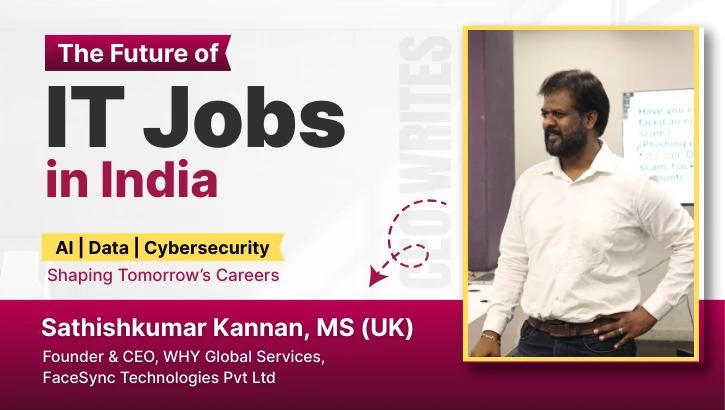
The IT industry has always been fast-moving, but in 2025
the pace feels diffe
rent. Artificial Intelligence, Data Science, and Cybersecurity are not just trends anymore, they
are fundamental forces reshaping how businesses operate.
From startups to Fortune 500 companies, every organization is undergoing a digital transformation. And with that, the demand for professionals who can adapt,
, and safeguard digital ecosystems is at an all-time high.
But here's the truth: the jobs of tomorrow won't look like the jobs of yesterday.
One of the most common fears I hear from students and employees is: "Will AI take away my job?"
My answer is always this:
"AI won't take your job, but someone skilled in AI will"
Think about it. AI doesn't work on its own. It needs developers, analysts, engineers, and cybersecurity professionals to design, train, and maintain it. Those who learn to leverage AI will not just survive, they will thrive.
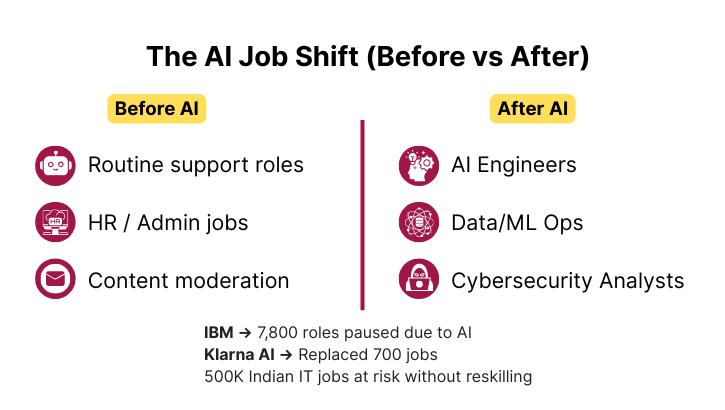
Over the last 18 months, multiple blue-chips have explicitly tied workforce changes to AI. In retail fintech, Klarna's AI assistant now handles two-thirds of all service chats and performs the work of 700 full-time agents, with faster resolutions and fewer repeat contacts a concrete signal of labor substitution at scale.
In enterprise tech, IBM said 7,800 back-office roles could be replaced by AI/automation over five years and paused hiring in those areas, indicating where displacement pressure will land first (HR, finance, admin).
In SaaS, Dropbox cut 16% (≈500 roles) while its CEO cited the "AI era" reshaping needed skill mixes, a pattern echoed across big tech restructurings.
Zooming out, AI is now a distinct, trackable layoff reason in U.S. data: outplacement firm Challenger, Gray & Christmas attributed 10,000+ job cuts in Jan to Jul 2025 specifically to generative AI adoption, placing "technological updates/AI" among the top catalysts this year.
Content moderation is another frontline: TikTok is laying off several hundred U.K. moderators as it automates more than 85% of takedowns with AI, part of a global restructuring of trust-and-safety operations.
In India, the story is mixed, but the numbers are getting bigger. TCS announced plans to cut 12,000 roles (≈2% of workforce) over FY25–26, framing it as a skills-mismatch/AI era redeployment challenge rather than a pure cost-cut; analysts still read it as part of the same automation wave changing the $283B outsourcing sector's labor equation.
Industry bodies warn displacement risk is real: a global union brief put up to 500,000 Indian IT jobs at risk over three years without rapid reskilling and worker voice in AI rollouts; NASSCOM likewise flags accelerated AI adoption and a sharp tilt toward niche, AI-literate roles.
At the same time, leaders like HCLTech emphasize "augmentation, not replacement," even as headcount declines and AI "copilots" become mandatory productivity tools, evidence that net effects will vary by firm, function, and how fast teams re-skill.
The signal in the noise is clear, AI is already eliminating or compressing certain workloads (moderation, Tier-1 support, routine back-office), and upgrading others (AI-assisted engineering, data/ML ops, cybersecurity). The organizations that pair AI adoption with large-scale upskilling are retaining and redeploying; those that don't are defaulting to layoffs + rehiring for new skills. The career strategy is obvious: move into the "builders of AI or protected by AI" categories (Data/ML, platform engineering, security, AI product ops) rather than the "done-by-AI" categories (highly repetitive, rules-based tasks).
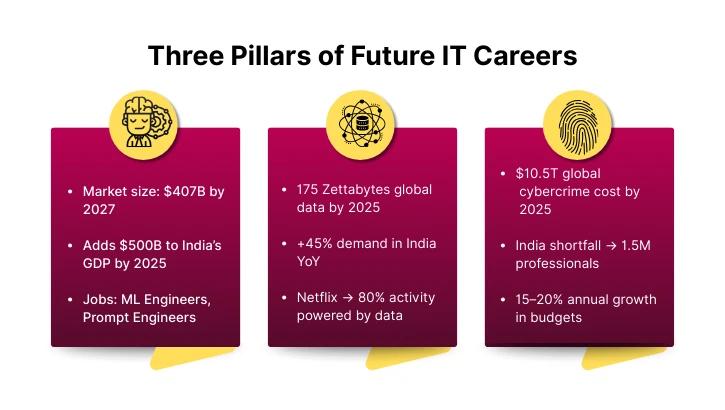
AI is no longer a niche—it is embedded in every industry. The demand is exploding. The global AI market is projected to reach $407 billion by 2027 (MarketsandMarkets, 2023). Roles such as ML Engineers, Prompt Engineers, and AI Product Managers are among the fastest-growing jobs globally (LinkedIn Emerging Jobs Report, 2024).
In India, AI adoption alone is expected to add $500 billion to GDP by 2025 (NASSCOM & McKinsey, 2022). Companies are seeking professionals with expertise in frameworks like TensorFlow, PyTorch, Hugging Face, and Generative AI tools.
Klarna, the Swedish fintech company, replaced around 700 customer support roles with an AI assistant, which now manages two-thirds of all customer chats with higher resolution rates (The Guardian, 2024).
Takeaway: AI will not remove opportunities, it will shift them toward those who can design, train, and apply AI responsibly.
Data is the new oil, but its true value comes from refining it into insights. Global data creation will reach 175 zettabytes by 2025 (IDC, 2021). Organizations need Data Analysts and Data Scientists to turn raw data into actionable strategies.
Skills in Python, R, SQL, Tableau, Power BI, Apache Spark, and BigQuery are in high demand. Data Scientist has ranked among the Top 10 best jobs for the past 7 years (Glassdoor, 2023). In India, demand for data professionals is growing by 45% year-on-year, particularly in BFSI, healthcare, and e-commerce sectors (Analytics India Magazine, 2023).
Netflix's recommendation engine powered by Data Science, accounts for approximately 80% of user activity (Forbes, 2022).
Takeaway: Every modern business decision is increasingly data-driven, making analytics the engine of strategy.
As digital adoption accelerates, cybercrime follows. Cybercrime will cost the world $10.5 trillion annually by 2025 (Cybersecurity Ventures, 2022). India alone faces a shortage of 1.5 million cybersecurity professionals (ISC² Workforce Study, 2023).
The most in-demand roles include Penetration Testers, Cloud Security Engineers, and SOC Analysts. Certifications such as CEH, CISSP, CISM, CompTIA Security+, and CCSP are increasingly viewed as golden tickets to employment. Global cybersecurity budgets are rising 15–20% annually (PwC Digital Trust Insights, 2024).
In 2022, India's premier hospital, AIIMS Delhi, was hit by a massive ransomware attack that disrupted services for weeks (The Hindu, 2022).
Takeaway: Cybersecurity is one of the most future-proof career paths, with demand significantly outpacing supply worldwide.
India is poised to become a global IT talent hub.
Degrees still matter, but companies no longer hire only based on academic performance. Instead, they look for:
In short, the future of IT belongs to those who can learn, unlearn, and relearn quickly.
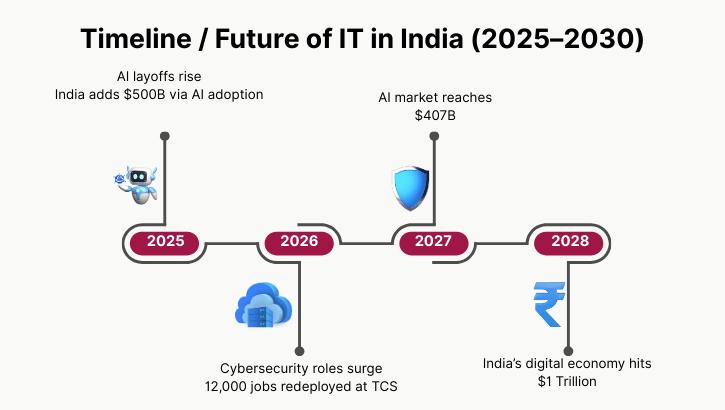
At WHY TAP, we understood very early that traditional education alone cannot create employable graduates. What students need is not more theory, but the ability to apply knowledge, build real projects, and face the corporate world with confidence.
That is why our programs are designed around four pillars that go far beyond classroom learning:
From Day 1, our students are not just learners, they are professionals in training. Every project they work on is a live industry assignment with real deliverables, deadlines, and teamwork. By the time they complete the program, they don't just carry certificates, they carry a portfolio that proves their worth to employers.
We blend human mentorship with AI-driven tools to give students the best of both worlds. While expert trainers guide them through concepts, AI-based platforms personalize learning, provide instant feedback, and simulate real-world challenges. This ensures students are future-ready, not past-focused.
We strongly believe that education should empower, not burden. That's why every WHY TAP student receives a stipend, proof that their time, effort, and skills have value. This model builds accountability and motivation, transforming students from passive attendees into active, responsible professionals.
Our promise is simple: if you put in the effort, we will get you placed. Our dedicated placement division works with top companies, arranges interviews, and provides ongoing career coaching. We don't stop at training; we walk the entire journey from campus to corporate alongside our students.
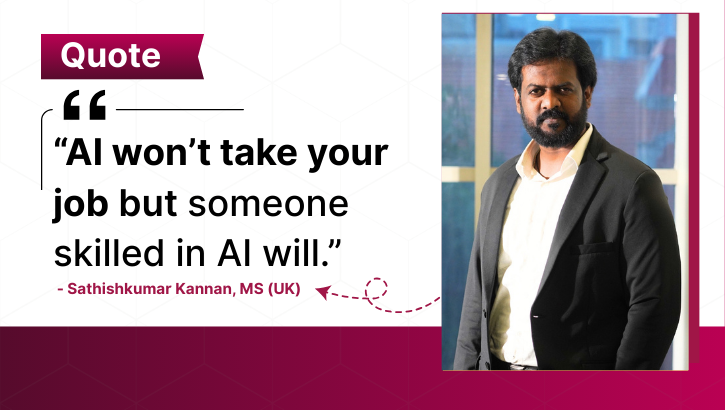
The future of IT jobs in India is not uncertain, it is overflowing with opportunities. Artificial Intelligence, Data, and Cybersecurity are not enemies to fear; they are gateways to the next era of careers. But only those who prepare, adapt, and skill themselves will be able to claim these opportunities.
My message to every student and job seeker is simple:
At WHY TAP, we stand with you in this journey. Our mission is to transform raw talent into industry-ready professionals who can thrive in any market, in any era. From campus to corporate, from uncertainty to employability, and from student to professional, we are your partner in success.
Because the future doesn't belong to those who wait. It belongs to those who prepare.